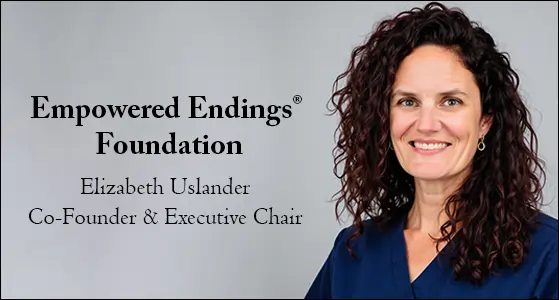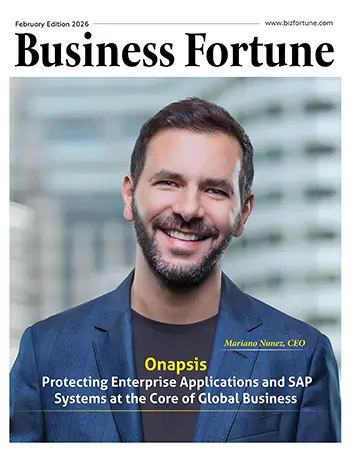Business Fortune

When it comes to the end of life, too many people find themselves caught in a system that treats death as a medical event rather than a deeply human experience. Families often struggle with unanswered questions, emotional isolation, and a lack of guidance at a time when clarity and compassion matter most. It’s a chapter marked not just by physical challenges but by spiritual and emotional ones that our healthcare system often overlooks.
The Empowered Endings® Foundation was created to change that. With a mission to humanize healthcare, the organization offers compassionate guidance, education, and community so that no one has to face this journey alone. From personalized care navigation and emotional-spiritual counseling to workshops and professional training, the Foundation is helping people approach life’s final chapter with dignity, clarity, and connection.
Elizabeth Uslander is at the forefront of this movement. Thanks to her unique background in social work and spiritual care, as well as her own experiences of loss and resiliency, Elizabeth has transformed Empowered Endings® into more than a foundation. With an approach that views death as a precious aspect of the human experience rather than something to be feared, her leadership serves as a reminder that kindness and presence can change everything, even in the most trying times.
In an exclusive interview with Business Fortune, Elizabeth Uslander, MSW, MTS, Co-Founder and Executive Chair of Empowered Endings® Foundation, shares the mission to humanize end-of-life care by reducing barriers and ensuring Empowered End of Life Experiences® for all. Through education, support, and community, the Foundation empowers families to navigate this chapter with dignity and clarity. Below is an excerpt from the interview.
Interview Highlights
Empowered Endings® Foundation was created with a bold vision to transform how we approach the end of life. What inspired the creation of this mission-driven initiative, and what gap did you set out to address?
The Foundation emerged from a heartbreaking recognition: that far too many individuals endure unnecessary suffering—not only physically, but also emotionally, spiritually, and systemically—at the end of life. Our healthcare system often falls short in addressing the holistic needs of patients and families during this vulnerable chapter. The Foundation seeks to bridge these gaps by offering a compass, a community, and a continuum of support. We are rehumanizing healthcare, ensuring that individuals are not left to navigate this complex terrain alone, but are met with dignity, presence, and possibility.
Through your work, you’ve cultivated an environment where individuals and families feel informed, supported, and empowered. How does Empowered Endings® Foundation help people navigate their end-of-life journeys with confidence and dignity?
We offer guidance grounded in clarity, compassion, and informed choice. By connecting individuals with experienced professionals, evidence-based education, and culturally sensitive emotional support, we help people face the unknown with greater confidence. Whether someone is seeking to understand legal rights, making values-based decisions, or feeling less isolated, we strive to ensure patients, families, and their providers can navigate their journeys with the dignity and agency we all deserve.
Education seems central to your model. Can you tell us about some of the tools, workshops, or resources the Empowered Endings® Foundation offers to help communities understand their rights, options, and pathways in end-of-life care?
Education is foundational to empowerment. Our online platform hosts a vibrant community engaged in dialogue about topics ranging from advanced care planning to healing from complicated grief. We offer free webinars, professional certifications, support groups, and expert-led workshops. Our resources demystify complex topics such as palliative care and Medical Aid in Dying, and help individuals explore not only their legal and medical options, but also their emotional, relational, and spiritual needs. Above all, we create spaces where people feel seen, heard, and informed.
Grief, uncertainty, and isolation often surround the experience of dying. How does Empowered Endings® Foundation foster a sense of connection, compassion, and clarity for those going through this chapter of life?
We meet people where they are— with deep presence and without an agenda. Through community gatherings, support groups, educational programs and workshops, and financial support when needed, we cultivate spaces and pathways that honor grief and make room for meaning. In many cases, our greatest offering is simply being there: attuned, compassionate, and unafraid to accompany someone through pain. We believe that healing begins in the presence.
Emerging therapies, like psychedelic-assisted treatments, are gaining attention in palliative care. How is the Foundation approaching these innovations to enhance patient comfort and peace?
We approach everything with curiosity and humility. Psychedelic-assisted therapies have been evidenced to offer a promising avenue for alleviating existential distress, particularly at the end of life. We enjoy partnering with leaders in the field to provide services, resources, and education to our community members. As we collaborate with practitioners and nonprofits, we work to ensure that, where appropriate, these modalities can be integrated safely, responsibly, and in alignment with our mission of ensuring access to information and compassionate, patient-centered care.
Your background in social work and spiritual care brings a unique perspective to your leadership. How have your personal and professional experiences shaped the ethos of Empowered Endings® Foundation?
Being a medical social worker and spiritual counselor taught me to listen with my soul—not just for what is said, but for what is meant, needed, and longed for. My own journey through major health challenges, the loss of loved ones, and deep grief has given me a visceral understanding of what it means to feel both broken and held. These experiences inform the Foundation’s ethos of radical presence, personal agency, and reverence for the full spectrum of human experience. We do not rush to fix what is sacred; we honor it.
It must be emotionally exhausting to lead a company that addresses such deep facets of the human condition. How do you and your team continue to be compassionate and resilient in your work?
We do it all together. Our resilience is rooted in our shared purpose and the deep camaraderie we cultivate as a team. The work we’re doing is sacred and meaningful. We celebrate life even as we advocate and grieve. There is a profound privilege in bearing witness to the final chapters of a person’s life. We do not take that for granted—and we support each other with the same care we offer to the people we serve.
As Empowered Endings® Foundation continues to grow, what are your hopes for its future impact—in terms of expanding community reach, deepening public understanding, and shaping how society engages with end-of-life experiences?
We hope we continue serving as a trusted presence in the lives of patients, families, and providers across the country—a lighthouse for clarity, information, and support in moments of darkness or uncertainty. We envision a world where every person, regardless of circumstance, has access to guidance, support, and dignity at the end of life. To that end, we envision establishing Empowered Endings® Centers in communities throughout the nation where people can get the care and counseling, education and training, and resources and community needed to ensure an Empowered End of Life Experience® for all. More broadly, we hope we help transform society’s relationship with death— reframing it not as a failure or a medical emergency, but as an inevitable and sacred part of being human and normalizing conversations around it.
What are some misconceptions you often encounter about end-of-life planning or support, and how is the Foundation helping to reframe these narratives?
A common misconception is that end-of-life planning is cold, clinical, or only relevant when death is imminent. In reality, it is one of the most intimate and loving acts we can offer to those we care about. By normalizing these conversations, we help people move from fear to clarity, from avoidance to agency. We are shifting the narrative from death as a taboo to death as a shared human experience—one to approach with grace, honesty, and intention. Our experience has shown that having these conversations early in life can help prevent a crisis later. We partner with estate planning attorneys, financial advisors, doctors, and death doulas to provide robust Advance Care Planning and End of Life resources to ensure expansive and engaging support at any stage of life.
About | Elizabeth Uslander
Elizabeth Uslander, MSW, MTS, is a mission-driven executive, seasoned healthcare professional, and passionate social entrepreneur working at the intersection of healthcare and humanity. As the Co-Founder and Executive Chair of the Empowered Endings® Foundation, Elizabeth leads efforts to ensure equitable access to optimal end-of-life care and education, making comprehensive support available to all patients, families, and professionals. A lifelong advocate for dignity, compassion, and agency, Elizabeth holds a Bachelor of Arts from Georgetown University and dual master’s degrees in Social Work (University of Southern California) and Theological Studies (Wesley Theological Seminary). She is a member of multiple honor societies, including Theta Alpha Kappa, Phi Alpha, and the Societé d’Arété, and professional organizations such as NASW, NHPCA, SDCCEOLC, and SDCCC. When not working to humanize healthcare, she finds joy in the beauty of nature, family, art, and travel.






















